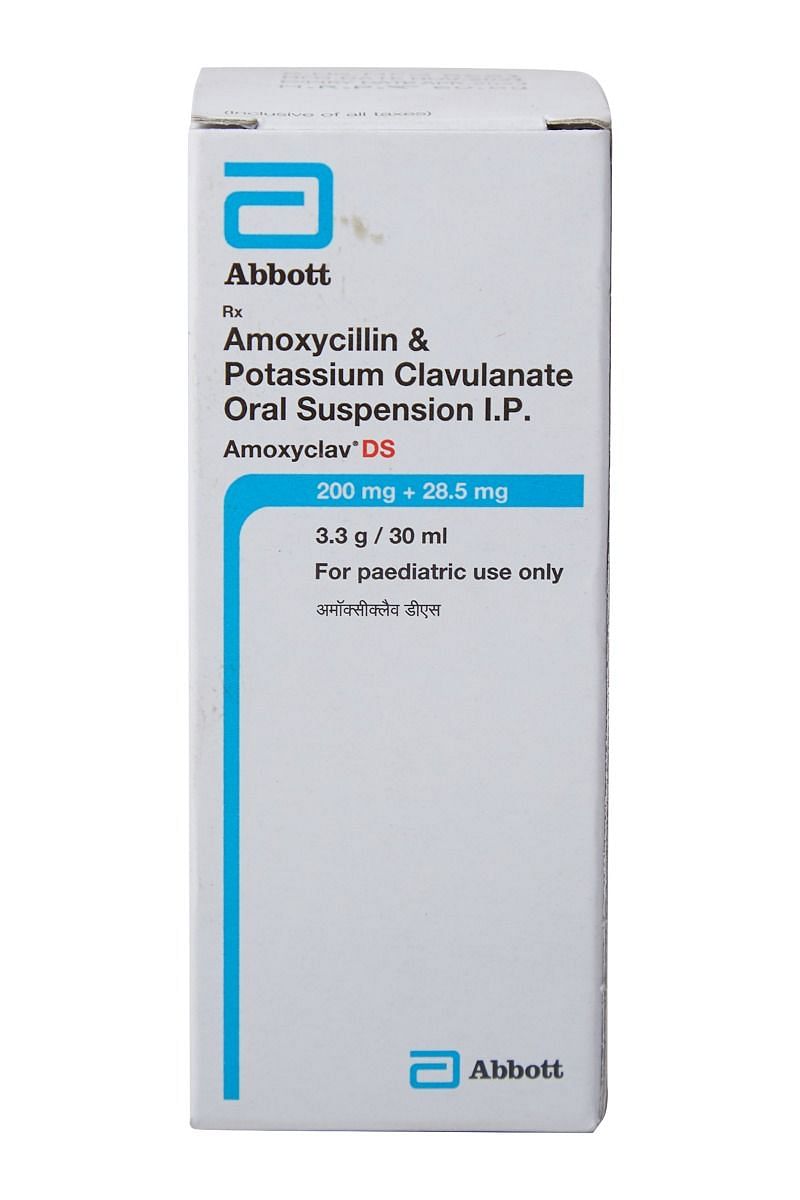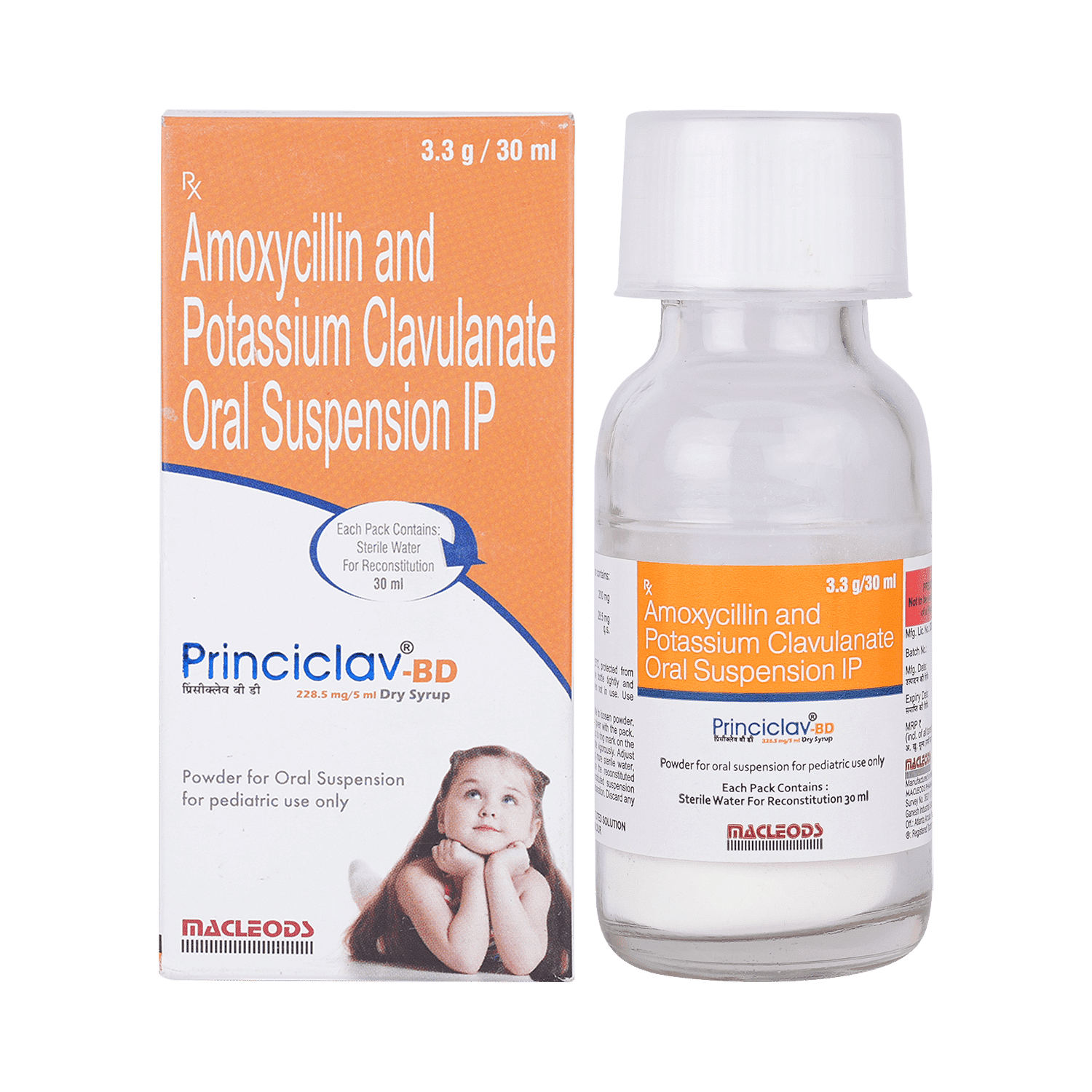
Oxymay Dry Syrup
Manufacturer
Unipure Biotech
Salt Composition
Amoxycillin (200mg) + Clavulanic Acid (28.5mg)
Key Information
Short Description
Oxymay Dry Syrup is an antibiotic medicine that helps treat bacterial infections of the ear, nose, throat, chest, lungs, teeth, skin, and urinary tract.
Dosage Form
Dry Syrup
Introduction
Oxymay Dry Syrup is an antibiotic medicine that helps treat bacterial infections of the ear, nose, throat, chest, lungs, teeth, skin, and urinary tract. It is capable of killing bacteria that have become resistant to other therapies and thus also helps treat tuberculosis that is resistant to other treatments. You can give Oxymay Dry Syrup to your child with or without food. It is better to give it with food as that helps increase absorption and decrease the risk of stomach upset. The doctor may prescribe giving it two to three times a day. Medicine dose depends on the severity of the infection, its type, and your child’s body weight and age.
Directions for Use
Take this medicine in the dose and duration as advised by your doctor. Check the label for directions before use. Dissolve the powder in sterile water. Shake well and use. Oxymay Dry Syrup is to be taken with food.
Safety Information
Side Effects
Vomiting Diarrhea Nausea Abdominal pain Allergy
Alcohol Warning
It is not known whether it is safe to consume alcohol with Oxymay Dry Syrup. Please consult your doctor.
Breastfeeding Warning
Oxymay Dry Syrup is safe to use during breastfeeding. Human studies suggest that the drug does not pass into the breastmilk in a significant amount and is not harmful to the baby.
Pregnancy Warning
Oxymay Dry Syrup is generally considered safe to use during pregnancy. Animal studies have shown low or no adverse effects to the developing baby; however, there are limited human studies.
How it works
Oxymay Dry Syrup is an antibiotic. It has two active agents, amoxycillin and clavulanic acid. Amoxycillin works by preventing the formation of the bacterial protective covering (cell wall) essential for the survival of the bacteria. Whereas clavulanic acid serves a special purpose of inhibiting an enzyme (beta-lactamase) that is produced by resistant bacteria. This makes the combination of amoxycillin and clavulanic acid an effective line of treatment for many types of infections.
Quick Tips
Your child must complete the entire course of antibiotics. Stopping too soon may cause the bacteria to multiply again or cause another infection. Eating citrus fruit or sipping plenty of water or fruit juice may help if your child has a bitter taste in the mouth after taking Oxymay Dry Syrup. Encourage your child to drink plenty of water in case diarrhea develops as a side effect. Never give Oxymay Dry Syrup until and unless prescribed by the doctor. Do not give Oxymay Dry Syrup to treat common cold and flu-like symptoms caused by viruses. Never save medicine for future illnesses. Check ‘expiry’ before giving Oxymay Dry Syrup to your child. Immediately discard all the expired medicines. Stop Oxymay Dry Syrup immediately if your child develops an itchy rash, facial swelling, or breathing difficulty.
Related Medicines

Amoxyclav Dry Syrup

Moxikind-CV Dry Syrup

Advent 228.5mg Dry Syrup Tangy Orange

Mpx-CV Dry Syrup

S Mocy CL Dry Syrup

Moxylik Dry Syrup

Dentoclav 200mg/28.5mg Dry Syrup

Aldomox Dry Syrup

Princiclav -BD Dry Syrup

Rzcv Bid Dry Syrup
Frequently asked questions
Can other medicines be given at the same time as Oxymay Dry Syrup?
Oxymay Dry Syrup may interact with other medications or substances. Before starting this medication, inform your child's doctor about all the medications they are taking. It is crucial to consult a medical professional regarding any new medicine for your child.
Can I get my child vaccinated while on treatment with Oxymay Dry Syrup?
Antibiotics generally do not interfere with vaccine ingredients or cause adverse reactions in children after vaccination. However, it is advisable to delay vaccination until the child has recovered from the illness. Once your child feels better, the vaccine can be administered.
Which lab tests may my child undergo while taking Oxymay Dry Syrup on a long-term basis?
Long-term therapy might involve periodic monitoring of kidney and liver function to track your child's overall condition. These tests can help ensure the treatment is effective.
Can I give a higher than the recommended dose of Oxymay Dry Syrup to my child?
Giving a dose greater than the recommended amount can increase the likelihood of side effects. If your child experiences worsening symptoms, please contact their doctor for re-evaluation.
Can I stop giving Oxymay Dry Syrup to my child when the symptoms are relieved?
Do not discontinue Oxymay Dry Syrup without consulting a medical professional. It is important to continue the medication until its full course, even if your child feels better as it may still be working.
Can the use of Oxymay Dry Syrup cause diarrhea?
Yes, some children may experience diarrhea while taking Oxymay Dry Syrup. This is a common side effect because the medication kills harmful bacteria and can also affect the beneficial bacteria in your child's stomach.
Do all viral common colds result in secondary bacterial infection?
Usually, viral infections do not lead to secondary bacterial infections. In fact, giving antibiotics during a viral infection can increase the risk of side effects, so it's important to consult your child's doctor about antibiotics only when absolutely necessary.
The mucus coming out of my child’s nose is yellow-green. Is it a sign of a bacterial infection?
Yellow or green mucus in the nose does not necessarily indicate a bacterial infection. During a common cold, mucus can thicken and change color to be yellow or green as well. Most symptoms resolve within 7-10 days.
Is there any sign which shows that my child needs immediate medical attention?
Call your child's doctor immediately if you notice serious allergic reactions (difficulty breathing, skin rashes), gastrointestinal problems (diarrhea), or liver damage (weakness, paleness, vomiting). While rare, these side effects are life-threatening and require professional help.


